- Home
- John Jakes
Love and War Page 5
Love and War Read online
Page 5
Cameron’s expression certainly suggested the possibility. He shoved Stanley down on the cushions. “Now listen here. I like you, Stanley. What’s more, I trust you, and I can’t say that about many who work for me. Quit worrying about your brother. I’ll handle him. You’d be a damn sight smarter if you forgot about the past and took advantage of the present.”
With a dull look, Stanley said, “What do you mean?”
Calmer, Cameron sat down. “I mean take a leaf out of the book of that thief we just met. Find an opportunity and capitalize on it. I run my department strictly according to the law”—Stanley was too upset to laugh at the absurdity—“but that doesn’t mean I’m unwilling to see trusted associates prosper. Many little jobs must be done if we’re to accomplish the big one.”
It dawned then. “You mean I should seek a contract?”
Cameron slapped his knee. “Yessiree.”
“For what?”
“Anything our boys need. These, for instance.” Reaching down, he poked his left shoe, then rested his gaze on the newly painted ceiling while he mused. “The shoe industry’s the second biggest in the North, only it’s fallen on hard times lately. Bet there are a lot of small factories for sale in New England.”
“But I know nothing about the shoe indus—”
“Learn, my boy.” Snakelike, Cameron’s head shot toward him. “Learn.”
“Well, I suppose I could—”
“Sure.” Affable again, Cameron gave Stanley’s knee a second slap and stood. “Shoes are in damn short supply. It’s a fine opportunity for somebody.”
“I appreciate the suggestion. Thank you.”
Cameron beamed. “Good night, my boy.”
“Good night, sir.”
After the secretary left the hotel, Stanley sat staring at his feet for more than a minute. He always had trouble with decisions, but tonight was worse because of George. He had no more say in that matter. Could he withstand Isabel’s fury when she learned that the man who’d forced them out of Lehigh Station was now being invited to become Stanley’s rival once again?
6
“WOULDN’T HAVE THIS WAR if it wasn’t for the niggers.”
“You’re wrong. It’s them rebs pulling out of the Union that started it. I say fight for the flag but not the darkies.”
“I’m with you there. Way I see it, the best way to solve the problem would be to shoot ’em all.”
The comment generated loud agreement from several other civilians at the Willard bar. The solitary officer held the same opinion, but since he was in uniform, he made no comment. Some pro-nigger toady from the government might take notice.
The officer weighed two hundred and thirty pounds. A paunch inflated his spotless dress coat. In a dead white face that bright sunlight could broil red in half an hour, dark eyes shifted toward a corner table. One man still seated had been left by two others a moment ago. Of the pair departing, the younger man had a tantalizingly familiar face.
The officer sipped his whiskey and cudgeled his memory. He was thirty-seven, but his black hair had begun to show gray streaks six months ago. He applied dye every day to hide them and preserve a youthful appearance. Brevet Colonel Elkanah Bent only wished he could conceal his awareness of them as easily.
In that gray, he found intimations of his own mortality and a heightened sense of frustration with his career. He’d suffered career frustration during most of his adult life. But this past month it had worsened as he idled through the days in this benighted pro-Southern city. Bent hated Southerners almost as much as he hated blacks. He hated one Southerner, named Orry Main, most of all; Main and his Yankee classmate George Hazard. On top of that, Washington was the home of the only human being for whom Bent had any affection, and he was forbidden to see him.
The face of the departed stranger lingered in his mind. Bent motioned for the barkeep. “Did you see that gentleman who just left?”
“Secretary Cameron.”
“No, the one with him.”
“Oh, that’s one of his flunkies. Stanley Hazard.”
Bent’s hand clenched. “From Pennsylvania?”
“I suppose. Cameron brought a lot of political pals to the War Department.” A nod to the empty glass. “Need another?”
“Yes, I do. A double.”
Stanley Hazard. George Hazard’s brother, surely. That would explain the familiarity despite the soft, sagging face. For a moment such overwhelming emotions buffeted him that he felt sick, dizzy.
Orry Main and George Hazard had been one year behind Elkanah Bent at the Military Academy. From the start, they had despised him and conspired to turn others against him. He held them directly responsible for his failure to win promotions and commendations. That had been true at West Point and again during the war in Mexico.
In the late fifties, Bent had been posted to the Second Cavalry in Texas. There, Orry Main’s cousin Charles, a brash new lieutenant in the regiment, had further besmirched his record.
In this war, the Mains naturally sided with the Southern traitors. George Hazard had left the army years ago, but his younger brother, Billy, was in the Union engineers. Bent didn’t know the whereabouts of any of them, but this he did know beyond doubt: Elkanah Bent was destined for greatness. Supreme power. All of his adult life he’d believed he would emerge as the American Bonaparte, and he still believed it, even though an upstart Academy classmate, George McClellan, lately returned to the army, had somehow persuaded the gullible press to confer the title on him.
Never mind. What mattered was the power itself. It would bring recognition and reward for Bent’s military genius and, just as surely, the opportunity to destroy the Mains and the Hazards.
He gulped whiskey and fixed a clear image of Stanley’s present appearance in his mind. After he emptied the glass, he pulled out his watch. Past seven already. Soon it would be dark, and when it was, the streets were unsafe. Unlike the daytime police, those on duty at night were paid by the government, principally to protect public buildings, not citizens. He ought to be leaving. Though he wore his dress sword, he didn’t care to invite the attention of the thugs and robbers who hunted for victims when the sun went down. Men like that terrified him.
One more drink, then he’d go. He sipped it, struggling to summon satisfying visions of throttling Stanley Hazard or stabbing his sword into Stanley’s belly. The effort did him no good. The one he wanted to hurt was George. George and that damned Orry Main.
Clutching the hilt of his sword, he lurched out of Willard’s. He could feel and smell dampness in the air; another pestilential fog would soon be rising from the river. He bumped into an oyster-seller giving one last toot of his horn as he wheeled his cart away. Bent cursed the blurred figure and wove on through twilight shadows from which strange, taunting voices whispered to him. Real voices? Phantoms? He wasn’t sure. His walk approached a run.
Three blocks of this torment brought him to the safety of the boardinghouse. Panting, he climbed steps to the lighted veranda and huddled there until his tremors of relief subsided. Then he went into the parlor, where he found another boarder with whom he’d struck up an acquaintance. Colonel Elmsdale, a jug-eared New Hampshireman, chewed a cigar as he pointed to some papers on a table.
“Picked up my orders today. Yours, too. There they are. Not the best of news.”
“Not—the best—?” Licking lips already moist, Bent snatched the orders. The handwriting, typically ornate, seemed to writhe, as if snakes were somehow imprisoned in the paper. But he understood every word. He was so frightened, he passed wind uncontrollably. Elmsdale didn’t laugh or smile.
“Department of—Kentucky?”
A grim nod. “Army of the Cumberland. Do you know who’s in command? Anderson. The same slave-owning bungler who hauled the flag down at Sumter. I know a lot of people called him a hero, but I’m hanged if I do.”
“Where’s this Camp Dick Robinson?”
“Near Danville. Camp of instruction for volunteers.”
“Yes, and I’ve drawn the same. I’m no happier than you are, Bent. We’ll have greenhorns to command—bushwhackers behind every tree—nobody fighting by the book. I’ll bet the plowboys we’re supposed to train can’t even read the goddamn book.”
“There’s been some mistake,” Bent whispered, wheeling and stumbling to the stairs.
“There certainly has. The army kind.” Elmsdale sighed. “Not a thing we can do about it.”
Lumbering upstairs, Bent didn’t hear. Down a dusty, gas-lit hall reeking of stew beef and onions—the dining-room supper he was too sick to eat—he found his room. He slammed the door. Sank to the edge of the bed in the dark. Line duty. Commanding illiterates in a wilderness where a man ran a high risk of dying from the bullet of some Southern sympathizer.
Or from the inattention of superiors who had all but forgotten his potential—his very existence—
What happened? In the stale dark, smelling of uniform wool and his own sweat, he was nearly crying. Where was his protector? From Bent’s earliest days that man had labored secretly on his behalf. Secured the Academy appointment from Ohio, and then, after the machinations of Hazard and Main brought dismissal, his protector had won reinstatement for him by an appeal to the Secretary of War. Except for unavoidable service in the Mexican War and that one posting to Texas, he’d always been given safe duty. He’d been kept in the army, out of danger—
Until now.
My God, they were sending him into exile. Suppose he wound up leading combat troops? He could die. Why had his protector let him down? Surely it was unintentional. Surely no one knew of these orders except a few army clerks. That had to be the explanation—
Still shaking, he decided on what he must do. It was a violation of the clear and long-standing agreement that he must never contact his protector directly. But this crisis—this absolute disaster—took precedence over the agreement.
He ran out of the room and down the stairs, startling Elmsdale, who was just coming up. “Fog’s gotten mighty thick out there. If you have to go somewhere, take your revolver.”
“I don’t need advice from you.” Bent shoved him. “Stand aside.” He lurched out the front door, sword scabbard swinging wildly. Elmsdale swore and said to himself, How has a lunatic like that managed to stay in the army?
7
THE HIRED HACK TURNED north into Nineteenth, where the homes were few in number. The wealthy built in this remote section to avoid the dirt and dangers of the central city.
“Which house between K and L?” the driver called.
“There’s only one. It takes up the whole block.”
Bent hung from the inside hand strap as if it were a life line in the ocean. His mouth felt hot, parched, the rest of his body cold. The Potomac fog hung drapes of dirty gauze over even the brightest windows.
Bent’s destination was the residence of a man named Heyward Starkwether. An Ohioan, Starkwether had no profession in the traditional sense, no office, no visible source of income, though he’d lived in the city twenty-five years. The only term to describe his circumstances during the last sixteen was opulent. Reporters new to Washington—young men, usually, and long on nerve, short on wisdom—sometimes described him as a lobbyist. The totally foolhardy substituted the words influence peddler. Elkanah Bent didn’t know a great deal about Starkwether’s affairs, but he did know that calling the man a lobbyist was the same as calling Alexander of Macedon a common soldier.
Starkwether was rumored to represent huge New York money interests, men almost Olympian in their wealth and influence. Men who could ignore any law if it suited them and shape government policy to fit a personal purpose. In their behalf, it was said, Starkwether had maintained friendships at the highest levels of government for more than two decades, through a succession of administrations, a fact that had long tinctured Bent’s affection with awe.
“Turn in here,” he exclaimed. The driver had almost missed the great bow-shaped drive in front of the mansion, more Greek temple than house. Fog hid its vast wings and upper floors, and Bent was puzzled by the empty drive and a lack of lighted windows. Several times before this he had driven past at night, always finding many visitors’ carriages outside and many gaslights blazing within.
“Wait for me,” Bent said, lumbering up wide marble steps to the entrance. He let one of the huge lion’s-head knockers fall twice. The sound went rolling away and away inside. Was his protector gone? Thinking of Starkwether, Bent seldom used any other word, especially not the more common but forbidden one.
He knocked again. An elderly servant with reddened eye sockets answered. Before he could speak, the visitor blurted, “I am Colonel Elkanah Bent. I must see Mr. Starkwether. It’s urgent.”
“I’m very sorry, Colonel, but it’s impossible. This afternoon, Mr. Starkwether was unexpectedly—” the old man had trouble saying it—“stricken.”
“Do you mean a paralytic seizure?”
“Yes, sir.”
“But he’s all right, isn’t he?”
“The seizure was fatal, sir.”
Bent walked back to the hack, seeing nothing, hearing nothing, wondering how to save himself now that he’d lost his father.
8
“HE’S COMING HERE? WITH that Catholic bitch who lords it over us as if she’s royalty? Stanley, you imbecile! How could you allow it?”
“Isabel,” he began in a faint voice as she flounced toward the parlor windows overlooking Sixth Street. She showed him the back of the drab gray hoop skirt and matching jacket she wore for everyday. She groaned, so loudly you might have thought some man was ravishing her. Damn slim chance of her permitting that, Stanley thought pettishly.
His wife kicked her hoops to permit a quick turn, another confrontation. “Why in the name of God didn’t you speak against the idea?”
“I did! But Cameron wants him.”
“For what possible reason?”
Stanley offered a few of Cameron’s explanatory phrases, as best he could remember them. Just the anticipation of this quarrel had exhausted him. He’d spent most of the day rehearsing what he’d say and completely forgotten it when the moment arrived. Sprawled in a chair, he finished with a lame “There’s a strong possibility that he won’t come.”
“I wish we hadn’t either. I detest this cursed town.”
He sat silent as she strode around the parlor three times, working off some of her rage. He knew she didn’t mean that last remark. She loved being in Washington because she loved power and associating with those who controlled it.
Their current circumstances weren’t ideal, of course. With decent quarters hard to find, they’d been forced to rent this dusty old suite in the cavernous National Hotel, a hangout of the secesh crowd. Stanley wished they could move. Quite apart from politics, a hotel was the wrong place in which to raise two headstrong adolescent sons. Sometimes Laban and Levi disappeared in the mazy corridors for hours. God knew what lascivious lessons they learned, listening at closed doors. When Stanley had gotten here at seven, Isabel reported that she’d found Laban giggling in a familiar way with one of the young maids. Stanley had lectured his son—torture for him and boring for the defiant boy. He had then ordered the twins to study Latin verbs for an hour and locked their bedroom door. Mercifully, all sounds of fist-fighting had now stopped; he presumed they were asleep. Small wonder religious Americans considered Washington an immoral place; the first evidence cited was the town’s teeming hotel life.
Isabel completed her last circuit of the room and stopped, folding her arms over her small bosom and challenging him with her eyes. Two years older than Stanley, she had grown increasingly forbidding as she aged.
In response to her glare, he said, “Isabel, try to understand. I did object, but—”
“Not strongly. You never do anything strongly.”
His back stiffened as he stood. “That’s unfair. I didn’t want to harm my
good standing with Simon. I had the impression you considered it an asset.”
Isabel Hazard was an expert manipulator of people, most especially her husband. She saw she’d pushed too hard. The understanding damped her anger. “I do. I’m sorry for what I said. It’s just that I despise George and Constance for all the humiliation they’ve heaped on you.”
The truce established, he moved to her side. “And you.”
“Yes. I’d like to repay them for that.” She cocked her head, smiling. “If they did come here, perhaps I could find a way. We know important people. You have some influence now.”
“We might do it at that.” He hoped his lack of enthusiasm didn’t show. Sometimes he truly hated his brother, but he had also been frightened of him since they were boys. He slipped his arm around her shoulder. “Let me have a whiskey while I tell you some good news.”
Isabel allowed him to guide her to a sideboard where fine glass decanters held the best brands of spirits. “What is it? A promotion?”
“No, no—I guess news is the wrong word. It’s a suggestion from Simon, a boon to soothe my objections about George.” He described the meeting with the contractor and the subsequent conversation with Cameron. Isabel saw the potential instantly. She clapped her hands.
“For that idea, I’d let ten George Hazards come to town. We wouldn’t be dependent on the factory—or your brother’s whims—for our principal income. Just imagine the money we could make with a guaranteed contract—”
“Simon offered no guarantees,” Stanley cautioned. “You don’t dare state such things explicitly. But I’m sure it’s what he meant. The department operates that way. Right now, for instance, I’m working on a plan to save the government money when it transports soldiers from New York to Washington. The present cost is six dollars a head. By rerouting the troops on the Northern Central through Harrisburg, we can cut that to four.”
“But the Northern Central is Cameron’s line.”
Feeling better with whiskey in him, Stanley winked. “We don’t generally advertise that.”

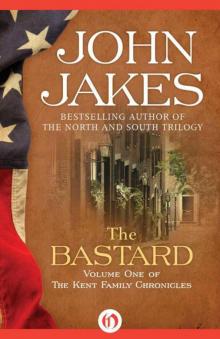 The Bastard
The Bastard The Furies
The Furies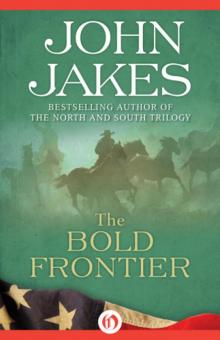 The Bold Frontier
The Bold Frontier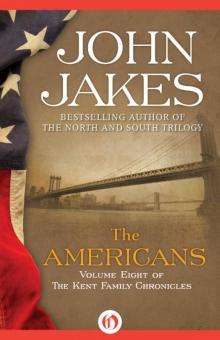 The Americans
The Americans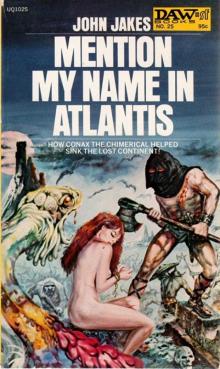 Mention My Name in Atlantis
Mention My Name in Atlantis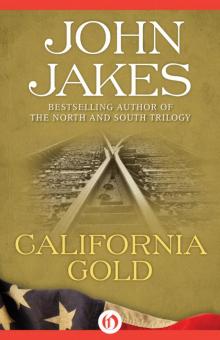 California Gold
California Gold North and South
North and South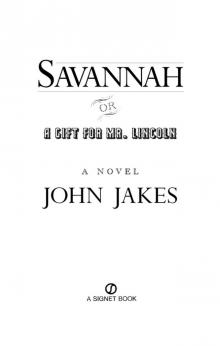 Savannah, or a Gift for Mr. Lincoln
Savannah, or a Gift for Mr. Lincoln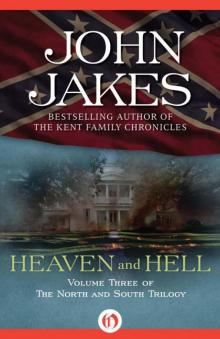 Heaven and Hell
Heaven and Hell Homeland
Homeland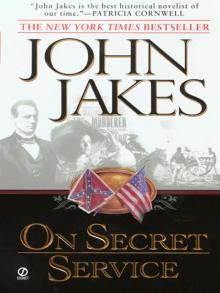 On Secret Service
On Secret Service The Lawless
The Lawless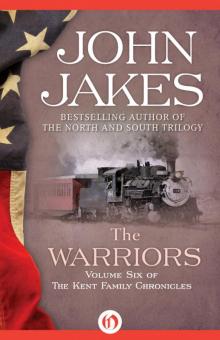 The Titans
The Titans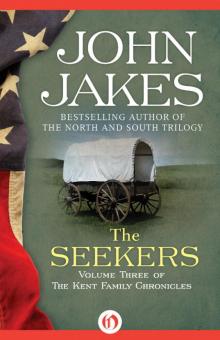 The Seekers
The Seekers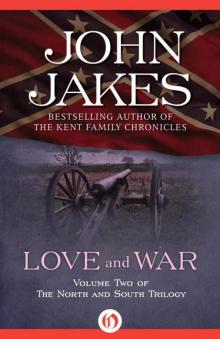 Love and War
Love and War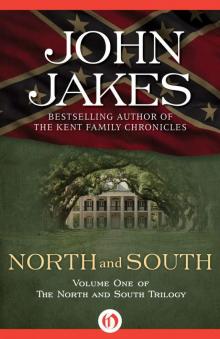 North and South: The North and South Trilogy (Book One)
North and South: The North and South Trilogy (Book One)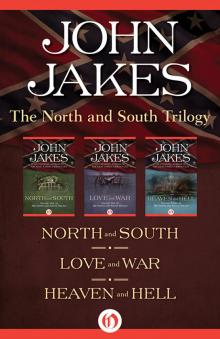 North and South Trilogy
North and South Trilogy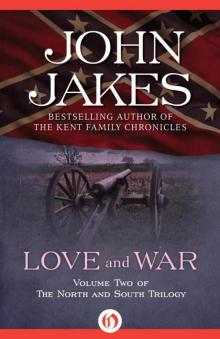 Love and War: The North and South Trilogy
Love and War: The North and South Trilogy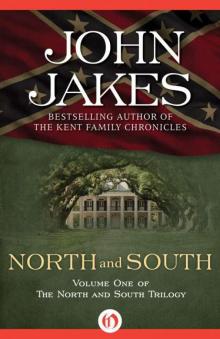 North and South: The North and South Trilogy
North and South: The North and South Trilogy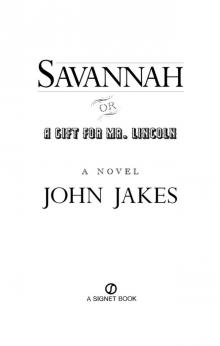 Savannah
Savannah Lawless
Lawless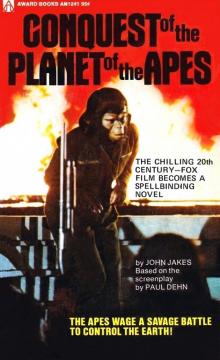 Conquest Of The Planet Of The Apes
Conquest Of The Planet Of The Apes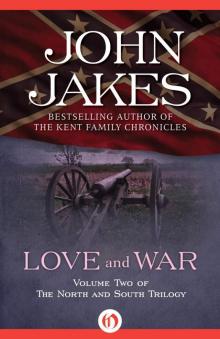 Love and War: The North and South Trilogy (Book Two)
Love and War: The North and South Trilogy (Book Two)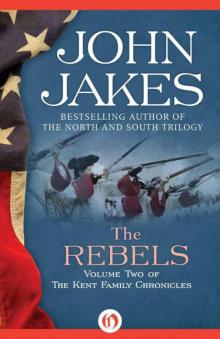 The Rebels: The Kent Family Chronicles
The Rebels: The Kent Family Chronicles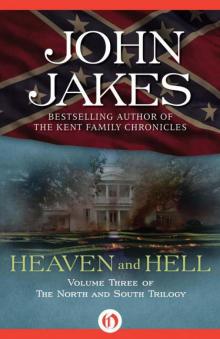 Heaven and Hell: The North and South Trilogy
Heaven and Hell: The North and South Trilogy Planet of the Apes Omnibus 2
Planet of the Apes Omnibus 2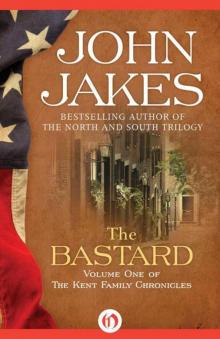 The Bastard: The Kent Family Chronicles
The Bastard: The Kent Family Chronicles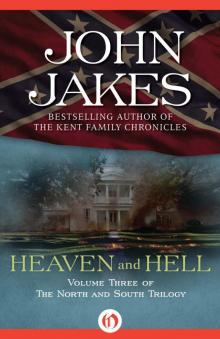 Heaven and Hell: The North and South Trilogy (Book Three)
Heaven and Hell: The North and South Trilogy (Book Three)